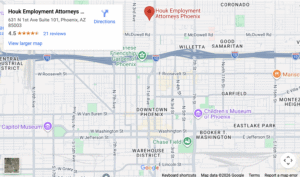
Unpaid internships are legal in Phoenix, AZ, and they can be attractive opportunities for students and recent graduates seeking experience. However, their legality is strictly governed by federal law. Simply labeling a position an “internship” does not automatically exempt an employer from certain workers’ rights, including paying minimum wage. Understanding the rules is crucial for both employers and interns.
The Federal Framework for Unpaid Internships

The primary law determining the legality of unpaid internships is the federal Fair Labor Standards Act (FLSA). This law establishes minimum wage, overtime pay, recordkeeping, and youth employment standards. For-profit employers must generally pay employees for their work. The critical question is whether an intern is considered an “employee” under the FLSA.
Courts and the U.S. Department of Labor (DOL) use the seven-factor “primary beneficiary” test to make this determination, where no single factor is determinative. This test examines the economic reality of the intern-employer relationship to see who benefits most. Key considerations include: both parties must clearly understand that no compensation is expected, as any promise of pay suggests employment.
Consequences of Illegal Unpaid Internships
Misclassifying an employee as an unpaid intern carries significant risks for employers, including back wages, liquidated damages, civil penalties, reputational damage, and even private lawsuits. Unpaid interns are in a particularly vulnerable category and may fear employer retaliation for inquiring about the legality of their arrangement.
Employers should carefully structure internships to meet all factors of the primary beneficiary test. Focus on the educational and training aspects. Document the program’s structure and learning objectives. Avoid using interns to perform core business tasks or replace paid staff. Consult with legal counsel or HR professionals specializing in wage compliance before offering unpaid internships.
Interns must understand the criteria for a legal unpaid internship. It is wise to be wary of positions that involve primarily routine work, little supervision or training, or operate like a regular job without pay. If your duties seem like those of an employee, you may be entitled to compensation. Know your rights under the FLSA.
Exceptions for Nonprofits and Government
Unpaid internships in Phoenix, AZ, are only legal under specific, narrow conditions defined by the federal FLSA’s primary beneficiary test. For-profit employers must ensure their internship programs are genuinely educational, primarily benefit the intern, and do not displace regular employees. Both employers and interns should be aware of these criteria to avoid violations and ensure fair, lawful internship experiences.
However, the rules differ slightly for unpaid interns at nonprofit organizations and government agencies. While these entities are often exempt from the FLSA’s minimum wage requirements for their regular employees performing charitable work, caution is still advised. The relationship should still primarily benefit the intern and involve training and learning, not simply performing routine work that replaces staff. Legal counsel should be consulted to ensure compliance.
The rationale behind allowing exceptions for nonprofits and governmental positions is that it allows for entities with limited funds to provide exposure to students interested in a particular field. Public service jobs often operate on tight budgets, and the labor provided by students goes toward benefiting the public, rather than generating a profit for shareholders.
Contact a Phoenix Employment Law Attorney for a Consultation
If you’re unsure whether your unpaid internship is legal — or if you’re an employer in Phoenix who wants to structure an internship program the right way — we can help. At Houk Law Firm, we’ll review your situation, explain your rights and obligations under federal and Arizona law, and guide you toward the best solution. Contact us today to schedule a confidential consultation with a Phoenix employment law attorney.

